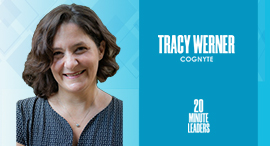20-Minute Leaders
“The most important thing in the employer branding strategy is that the employees need to feel like they own it.”
Tracy Werner, head of communications and employer brand at Cognyte says employer branding is about how employees and potential employees perceive the organization and the value they see in it.
Click Here For More 20MinuteLeaders
Tell me a little bit about you and how you ended up in the world of employer branding.
Employer branding is fairly new to me. I've been in communication roles for 20 years, and a year ago, I joined Cognyte as it was setting itself up for a spinoff from Verint. We were establishing ourselves with a new name in the market. We provide security analytics software. You're trying to recruit employees, and they've never heard the name before.
I'm responsible for internal communication; for PR, which is the external communication; social media; video; and employer branding. But they're really a family. They all work so beautifully together. I'm very lucky in Cognyte because I've got an amazing team. I'm learning a lot from the people who work for me. I've got a fantastic employer brand manager. Our CMO understands this world and saw the importance of it very, very early on. In the last year or two, it has simply blown up globally. It's become one of the most important things any company has.
So, what is employer branding? It's about how potential employees and existing employees look at the company, how they feel when they hear the name, what they think the company does, and the value they think the company would bring. It's how people see and perceive your company. It's the brand the company has externally, and how people talk about it inside and outside the company.
Why has it become so much more important today? With COVID, a lot of people stayed very static at the beginning. But then things started getting back on track. It was easier to interview. They started becoming interested in other companies. People felt like one thing they could change in this huge mess the world had become was where they worked. The job market went ballistic. The employer brand became critical, not just to retain employees, but also externally, to say, "If you're going to move, come to us."
 Tracy Werner, head of communications and employer brand at Cognyte. Photo: Tamara Barsky
Tracy Werner, head of communications and employer brand at Cognyte. Photo: Tamara Barsky
How do you actually manage a strategy for employer branding? Is it mainly in gifts that you give employees or are there different ways of creating this employer branding?
Of course, the employee experience is critical. But it's so much more. First of all, it has to align with the business goals. You work very closely with the teams and the people teams (HR) for recruiting purposes.
I think for me, the most important thing in the strategy is that the employees need to relate to it. They need to feel like they own it. It needs to be authentic.
For example, companies who have employer branding strategies develop something called an Employer Value Proposition. This is the DNA of the company that you try to communicate to the external world. The process was run in Cognyte several years ago before we became Cognyte. We took a deep dive into: What makes employees excited about working here? What differentiates this company from other companies?
Following that process and hearing the employees’ voices, we came up with three main elements that really identify us as a company. It's the people. It's the fact that there's the ability to move and grow and learn and change roles within the company. It's what our purpose is. People want to work for a place that's doing good. And the technology. They're dealing with some of the most complex challenges in the world. We've got some really brilliant people over here.
When we looked at those three things—at the people, at the purpose, at the technology—and brought them all together, we realized that the theme of curious appears in all of them. That's the brand that we chose and then rolled out.
What happens the next morning?
You validate it with the employees. You look globally. In different areas, you've got different things that appeal to the population. Then you look at how you can communicate to all of those areas. For example, in Israel and in several other countries around the world, we had a curiosity club where we had people that were coming to listen to lectures, before COVID, and hear about topics that related to curiosity, that related to technology.
Recently, we understood that mobility is something that's super important to people, the ability not just to move upwards but to move sideways in organizations. You don't have to leave a company in order to change your role. We've done a campaign on digital media around mobility. We've got some very cool animated videos that show the story of real employees who have moved over the years from one role to another, either laterally or upwards. That's really bringing in a lot of attention.
How do you know that it's working?
There are scientific ways that you go in and you analyze the results. If you have a campaign, we measure it like we would any other marketing campaign. It goes through a funnel where you expose people to it. Then you see who clicked on it and went through to the website. You can actually see from many, many hundreds of people who are exposed to campaigns that are targeted for specific audiences in specific countries how many in the end send their CVs.
We had a campaign earlier this year, when we did the spinoff, that was quite amazing. We had this amazing internal communication campaign. We sent all the swag to employees’ homes because they were still at home with COVID. We had a beautiful event around the spinoff when we went onto NASDAQ from our management's homes. We saw that employees created a viral campaign all by themselves. They were posting pictures of the stuff they got. It was unbelievable to see what happened from the employees. You can also see that that affected the campaign. When you look at the numbers afterwards, we realized that we got hundreds of CVs, even though we weren't even trying to recruit at the time.
So the numbers is one thing. The other: it's like any other marketing activity. Gut instinct. Are people talking about it? How excited are our employees getting about this? Are they sharing it?
Perhaps I can give you one more example. We're looking for a global head of recruiting. And the person hiring for it is amazing. She's dynamic. She's fun. We took her into the studio and took 20 minutes and recorded her. We realized that actually the bloopers from the recording were even more interesting than the recording itself. We posted the video where she kind of pokes a little fun at herself. She speaks about some of the terms we use in job postings that are overused. This thing has gone wild.
Take me back as far back as elementary school, middle school. Back then, were you also really interested in communications and culture?
I love people and I love talking. I always planned to be an actress. My formal education is in counseling, and I was an English teacher, but even there it's about bringing people together and making sure that messages get across. I think communication really ran through my blood.
If you had to choose a few words to describe yourself, what would they be?
Empathetic. I'm motherly. I have three kids of my own. But I think that the people around me feel like there's a mother hen in me. Ambitious. And caring.
 Michael Matias. Photo: Courtesy
Michael Matias. Photo: Courtesy
Michael Matias, Forbes 30 Under 30, is the author of Age is Only an Int: Lessons I Learned as a Young Entrepreneur. He studies Artificial Intelligence at Stanford University, is a Venture Partner at J-Ventures and was an engineer at Hippo Insurance. Matias previously served as an officer in the 8200 unit. 20MinuteLeaders is a tech entrepreneurship interview series featuring one-on-one interviews with fascinating founders, innovators and thought leaders sharing their journeys and experiences.
Contributing editors: Michael Matias, Megan Ryan



